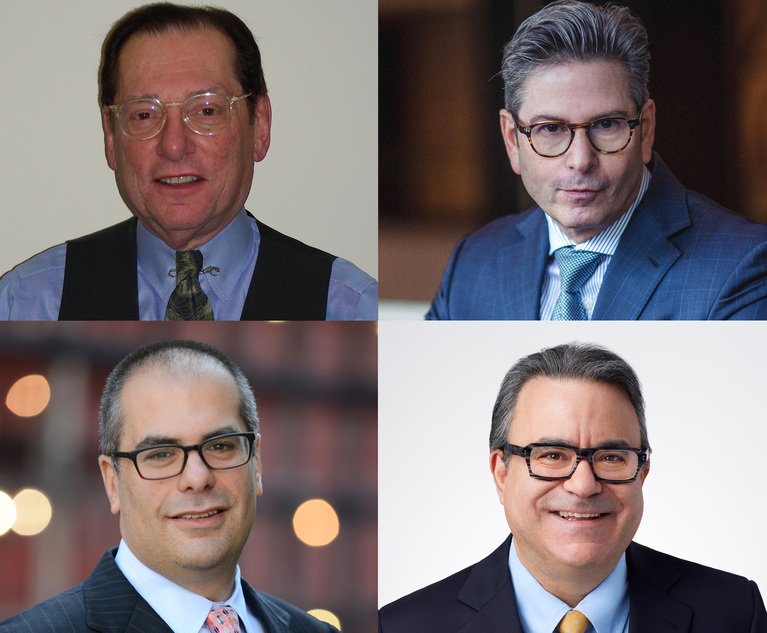Elliott Scheinberg

March 15, 2024 | New York Law Journal
CPLR 5511: Relief to Nonparties, to a Nonappealing ChildThis article discusses 'Johnson v. Johnson', which remedied such a concern even though the attorney for the child did not appeal from the order, as well as an understanding of aggrievement, CPLR 551, as it relates to nonparties and to nonappealing parties is instructive.
By Elliott Scheinberg
13 minute read

February 13, 2024 | New York Law Journal
General Rules and Their Exceptions in Appellate ProcedureThe legal universe is coated in general rules and principles but, as well known, general principles and rules have their individualized specific exceptions. This article examines such instances in appellate procedure.
By Elliott Scheinberg
13 minute read

December 29, 2023 | New York Law Journal
Noncompliance with CPLR 2215: Is Denied Relief Appealable?May a motion court grant relief to a cross movant who requested relief only in its opposition papers to a motion without having filed the formal notice of cross motion prescribed in CPLR 2215? If the motion court denies the sought relief, is that denial appealable as of right, by leave?
By Elliott Scheinberg
14 minute read

November 22, 2023 | New York Law Journal
Does Supreme Court Have Discretion To Disregard an Appellate Order To Enter Judgment?The title of this article suggests a notion that, in light of the highly complex and sophisticated rules of appellate procedure, is absurd. However, this very issue lies at the heart of the majority's compelling opinion, penned by Presiding Justice Diane T. Renwick, in 'Favourite v Cico'.
By Elliott Scheinberg
14 minute read

October 16, 2023 | New York Law Journal
Another Flawed Article by an Out-of-State WriterThe repeated need to correct Toby Kleinman's misinformation is unfair to readers of this publication and to those of us who understand that such misinformation in this very specialized area of law is dangerous to families and children.
By Elliott Scheinberg, Lawrence Jay Braunstein, Robert Z. Dobrish, Lee Rosenberg and Adam John Wolff
10 minute read

September 11, 2023 | New York Law Journal
Are Multiple Preservations Necessary Redux?Must an objection be raised during trial if it had been previously raised during the litigation? Although the Court of Appeals has held that one pretrial objection preserves the issue, this issue has recurred—but rulings have not always been consistent.
By Elliott Scheinberg
11 minute read

July 18, 2023 | New York Law Journal
Recent Column Published in the Law Journal 'Misleading' on New York's Protections for Children and Domestic Abuse Survivors[Editor's note: This article was submitted in response to Toby Kleinman's article "Accountability And Oversight: Domestic Violence, Child Abuse,…
By Robert Z. Dobrish, Lee Rosenberg, Elliott Scheinberg, Adam John Wolff and Eric I. Wrubel
4 minute read

June 14, 2023 | New York Law Journal
'T.H. v. M.B.,' Judiciary Law §753(3) and Child Support, Caveat CounselA Manhattan Supreme Court justice's recent ruling is dangerous because it can mislead members of the bar who rely on published decisions as gospel, as they often go unaddressed and uncorrected, a Law Journal columnist writes.
By Elliott Scheinberg
11 minute read

May 25, 2023 | New York Law Journal
Preservation: Constitutional Issues, Is an Entity a Professional for Malpractice PurposesHenry v. New Jersey Transit, with a profound dissent by Chief Judge Rowan Wilson, brings the issue of preservation of constitutional issues on appeal to the Court of Appeals to the forefront.
By Elliott Scheinberg
10 minute read

March 17, 2023 | New York Law Journal
Precatory Language in Agreements That Encourage Settlements Are Not Agreements to AgreeThe ruling in Pinto erroneously converts enforceable unambiguous agreements into unenforceable ones in the event they contain otherwise benign language which says no more, in form or in substance, than the parties may attempt settlement of a dispute arising from the agreement, however, should settlement efforts either prove unproductive or even if there have been no settlement efforts at all then they may litigate their dispute.
By Elliott Scheinberg
10 minute read
More from ALM
- Legal Speak at General Counsel Conference East 2024: Julie Cantor, Associate General Counsel at Studs, Inc. 1 minute read
- Legal Speak at General Counsel Conference East 2024: Chris Correnti, President & CEO & General Counsel AGC America, Inc. 1 minute read
- Legal Speak at General Counsel Conference East 2024: Marc Mandel, Senior Vice President & General Counsel at EXOS 1 minute read



